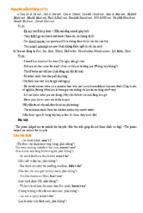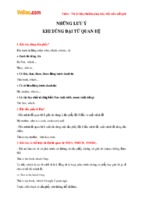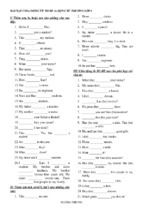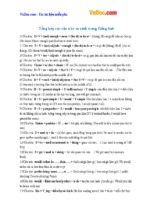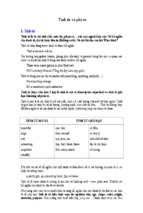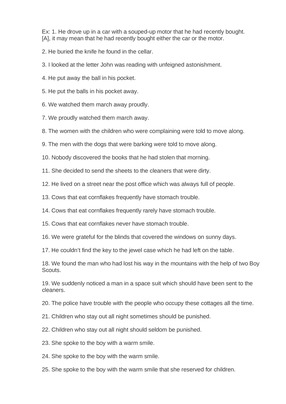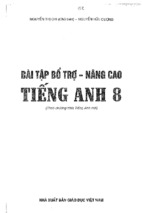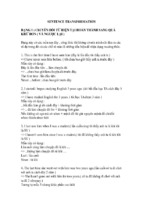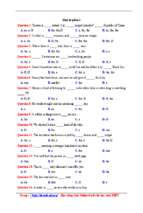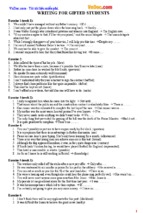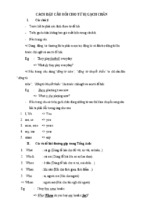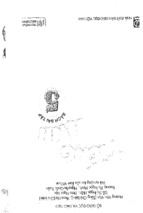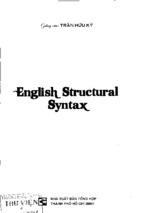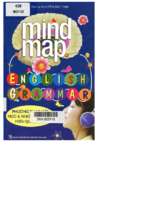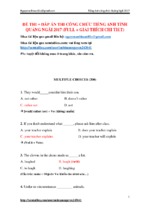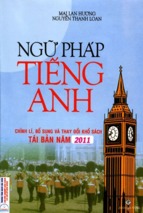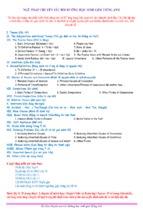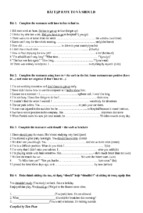DO NEF Int tst bklt Tests_2P
25/10/06
14:34
Page 1
Lara Storton
New
ENGLISH FILE
Intermediate
Test Booklet
This Test Booklet contains:
● an Entry test
● tests for each File, in A and B versions
Grammar, Vocabulary, and Pronunciation
Reading and Writing
Listening and Speaking
● an extended End-of-course test, in A
and B versions
● a Key
2
DO NEF Int tst bklt Tests_2P
25/10/06
14:34
Page 2
Introduction
In this test booklet you’ll find:
All the Tests consist of:
test
• aantestEntry
for
each
File of New English File Intermediate,
• in A and B versions
• an End-of-course test in A and B versions
• Grammar, Vocabulary, and Pronunciation
• Reading and Writing
• Listening and Speaking
Total score
The Entr y test
The Entry test is an optional test which covers some of the
key Grammar and Vocabulary points from File 1. You may
want to give your students this test so that you can get an
idea of their starting level – for example, are they complete
beginners or do they have some knowledge of English
already, and how much basic language do they know? If
your class are at a very low level, look out for the Extra
support ideas in the Teacher’s Book. If they are stronger,
look out for the Extra challenge ideas.
50
20
30
100
If you do the Grammar, Vocabulary, and
Pronunciation test but not Reading, Writing,
Listening, or Speaking, double your students’ marks to
give a total score out of 100, e.g.
Grammar, Vocabulary, Pronunciation mark
38 50
Total score out of 100
76 100
These tests may be photocopied freely for classroom use. They
may not be adapted, printed, or sold without the permission
of Oxford University Press.
The A and B tests
There are two versions (A and B) of each File test and the
End-of-course test, except the Speaking tests, which are
designed for students to do in pairs. The A and B tests cover
exactly the same material, but the questions have been
changed and reorganized to allow easy and effective
administration of the tests in the classroom – it becomes
almost impossible for students to copy answers. If copying
isn’t a problem with your class, you can just use the A tests.
Listening tests
All the Listening tests re-use listenings from the Student’s
Book. Some students may remember the contexts of the
listenings, but they are very unlikely to remember the
detail, and the listening exercises are all KET-type tasks
which are different from the tasks that students have
already done.
The Listening numbers
1.9
are indicated in the Answer key.
Answer key
The Answer key for the tests starts on page 65.
2
New English File Intermediate photocopiable © Oxford University Press 2006
DO NEF Int tst bklt Tests_2P
25/10/06
14:34
Page 3
Marking guidelines
WR ITI N G
10 MAR KS
Task completion
The task is fully completed and the answer easy to understand.
4 marks
Grammar
The student uses appropriate structures to achieve the task.
Minor errors do not obscure the meaning.
3 marks
Voc abular y
The student uses a sufficient range of words and phrases to
communicate the message clearly.
3 marks
S P EAKI N G
20 MAR KS
Interactive communic ation and oral production
The student communicates effectively with his / her partner,
asking and answering simple questions, and where necessary
initiating conversation, and responding. The student uses
appropriate strategies to complete the task successfully.
10 marks
Grammar and Voc abular y
The student uses a sufficient range of vocabulary and structure
to communicate clearly. Minor occasional errors do not
impede communication.
5 marks
Pronunciation
The student’s intonation, stress, and articulation of sounds
make the message clear and comprehensible.
5 marks
New English File Intermediate photocopiable © Oxford University Press 2006
3
DO NEF Int tst bklt Tests_2P
25/10/06
14:34
Page 4
Entry test
12 It’s snowing. ______
G R AM MAR
C Put your hat on
Example: They ______ from Rome. They’re from
Florence.
A not
■
✓
B aren’t ■
C isn’t
■
B already
■
C yet
■
■
B did
■
C do
■
B was sitting
■
■
B Has
■
C has parked
■
■
A won’t
C sit
■
■
■
C Have
B was parking
C often go to
■
B don’t have to
C must to
■
B too many
■
B already
■
■
B So
■
■
C a few
■
■
B Swimming
■
■
■
C could
■
B built
■
C was build
■
■
B many
■
C lots
■
19 He ______ me not to tell anyone.
A say
■
B told
■
A nothing
■
C said
■
B would
■
C do
■
C yet
A for
■
C Either
■
■
C Swiming
■
B anything
■
C something
■
22 They’ve lived in the same house ______ forty years.
■
B since
■
C ago
■
23 I ______ come and see you tonight if I can borrow
Joe’s car.
A must
■
B might
■
C have to
■
24 I think this is the ______ song on the CD.
11 ______ in the sea makes you really strong.
A Swim
B must
21 Let’s order a pizza. We don’t have ______ to cook for
dinner.
10 ‘I don’t want to rent a horror film.’ ‘______ do I.’
A Neither
■
C wouldn’t
17 This castle ______ in 1600.
A will
9 Hello! Come in. I’ve ______ made some coffee.
Would you like some?
A just
■
20 What ______ you do if she doesn’t reply to your email?
■
B always go
■
B not
■
A should
A much
■
■
B Do you go
18 I don’t have ______ money left, because I bought a
new jacket.
■
8 I put ______ salt in the pasta.
A a little
■
A was built
7 I ______ the gym on Thursday evenings.
A go usually to
■
16 I need some advice. What ______ I do?
6 We ______ work tomorrow.
A haven’t to
C who
15 She ______ invite him if she didn’t want him to come.
5 He couldn’t remember where he ______ his car.
A had parked
■
■
C Will you go
4 ______ you ever been to the museum?’ ‘No, this is the
first time.’
A Had
■
B which
A Are you going
■
■
■
14 ______ to the basketball match on Saturday?
3 I ______ in the park when it started raining.
A sat
■
A where
2 What ______ you do yesterday afternoon?
A are
■
B Your hat put on
13 A key is a thing ______ you use to open doors.
1 ‘Have you finished that report?’ ‘No, not ______.’
A just
■
A Putting your hat on
Tick (✓) the correct answer A, B, or C.
■
A better
■
B most best
■
C best
■
25 That case is too heavy for you. I ______ you.
A ’ll help
■
B help
■
C ’m going to help
■
25
4
New English File Intermediate photocopiable © Oxford University Press 2006
DO NEF Int tst bklt Tests_2P
25/10/06
14:34
Page 5
Entry test
VO C AB U L ARY
12 Did you ______ sightseeing in Prague?
Example: The film was really ______. I nearly fell
asleep.
■
■
✓
B boring ■
A exciting
C funny
■
C earn
■
B on
■
■
B mean
■
■
■
B do
■
C cook
■
■
B go
■
C have
■
B Mosquitoes
■
■
B take
■
C try
■
C Wasps
■
B back
■
C on
■
B modern
■
■
■
B passes
■
C noisy
■
C fails
■
11 Tower Bridge goes ______ the River Thames.
A over
■
B under
■
B legs
■
B like
■
■
■
C hands
■
B untidy
■
C to
B dangerous
■
C mean
■
■
■
C clean
■
B into
■
C down
■
20 This street is ______ at night – you can’t hear any
traffic.
A clean
■
A rude
B safe
■
A giraffe
10 He won’t be very happy if he ______ his driving
test again.
A misses
■
■
■
C quiet
B noisy
■
C polite
■
22 A ______ has a very long neck.
9 The bus was so ______ I couldn’t move.
A crowded
C boots
21 Say ‘please’. You have to be more ______.
______ to the shop.
■
■
A along
8 My new camera doesn’t work. I’m going to take it
A away
■
B tracksuit
18 It’s ______ to run when the floor is wet.
7 Excuse me, could I ______ on these jeans, please?
A get
■
C asked
19 I fell ______ the steps and broke my arm.
■
6 ______ have black and yellow stripes on their bodies.
A Flies
■
■
A safe
5 It’s really sunny. Let’s ______ for a walk.
A get
■
17 I look ______ my mother; we have the same eyes and
nose.
A as
4 I’m going to ______ a cake for Bill’s birthday.
A make
B told
A impatient
C generous
■
16 Don’t be so ______! You’ll have to wait.
3 Dan’s so ______. He pays for everything when we
go out.
A lazy
■
A said
A arms
■
C in
C go
15 Your ______ are cold! You should wear gloves.
■
2 The meeting is ______ 17 May at 2.00 p.m.
A at
■
13 He ______ me if I could tell him the way.
A trainers
■
B win
B make
14 I’ve bought a new ______ for the athletics competition.
1 I ______ a lot more money in my new job.
A had
■
A do
Tick (✓) the correct answer A, B, or C.
C through
■
■
B kangaroo
■
C bear
■
23 Can you turn ______ the radio? I want to listen to the
weather forecast.
A off
■
B on
■
C down
■
24 Adrian asked me if I could ______ him some money.
A lend
■
B borrow
■
C take
■
25 I’m sorry I’m late. I ______ the bus.
A missed
■
B left
■
C lost
■
Grammar and Vocabulary total
New English File Intermediate photocopiable © Oxford University Press 2006
25
50
5
DO NEF Int tst bklt Tests_2P
25/10/06
14:34
Page 6
NAME
1
A
Grammar, Vocabulary, and Pronunciation
3 Complete the sentences with shall / going to / will
or the present continuous.
G R AM MAR
1 Underline the correct form.
Example: We usually get up / get up usually early every
morning.
1 I don’t usually have / I’m not usually having dessert,
but I’ll have one tonight.
Example: I’m sure that Jess will help (help) you if you
ask her.
1 A I ________ (go) to town this afternoon.
________ (I /go) to the supermarket on my
way back?
2 Jake tries / is trying to get fit for the athletics
competition next month.
B Yes, we need bread, milk and some fruit.
3 In the summer, I often cycle / I’m often cycling
to work.
A OK. I ________ (get) all that, and some
eggs, too.
4 What are you doing / do you do this evening?
5 Helen don’t work / isn’t working tomorrow, so we’re
meeting for lunch.
6 Clare buys a lot of takeaways, but I prefer / I’m
preferring home-made food.
2 A I heard on the radio that the weather ________
(be) excellent this weekend.
B That’s good, because my parents ________
(come) to stay with me.
6
3 A I went to see Miami Vice yesterday at the cinema.
It’s excellent.
B Oh good. I ________ (see) it tomorrow.
2 Complete the sentences. Use the correct form of
the verb in brackets.
A I know you ________ (love) it.
7
Example: He was watching (watch) a film on TV when I
arrived.
Grammar total
1 I ________ (already / finish) cooking when Gill
offered to help.
VO C AB U L ARY
2 As soon as I arrived, we ________ (order) our food –
everyone had waited for me.
4 Underline the odd word out.
3 Manchester United ________ (win) 2–0 at half time,
but they lost the match 3–2.
20
Example: beans salmon spicy sausages
1 spicy prawns sweet fresh
4 We were really tired when we arrived because we
________ (not sleep) for 26 hours.
2 duck sausages chicken beans
5 You’re lucky I’m still here. I ________ (get) ready to
go out when you phoned.
4 grilled baked boiled raw
6 I was thinking about him when he ________ (ring) me!
6 frozen home-made menu low-fat
3 starter main course napkin dessert
7 Last week the boss ________ (say) he would give me
a pay rise, because I was so hard-working.
5 knife fork glass spoon
6
7
6
New English File Intermediate photocopiable © Oxford University Press 2006
DO NEF Int tst bklt Tests_2P
25/10/06
14:34
Page 7
NAME
1
A
Grammar, Vocabulary, and Pronunciation
5 Complete the sentences with one word.
P R O N U N C IATI O N
7 Write the words in the correct place.
Example: I get fit by running every morning.
1 He got ________ when he fell on the basketball court
and he couldn’t finish the game.
fruit circuit plate spectator sugar portion
2 In the NBA a basketball ________ is about 28 metres
long.
3 There is a new ski ________ in my town and it is
indoors.
4 I play tennis, and I ________ tai-chi.
__plate__
1 ________
2 ________
3 ________
4 ________
5 ________
5 A football ________ is about 100 metres long.
6 It is very important to warm ________ before
doing sport.
7 Volleyball and basketball are usually played indoors
in a sports ________.
7
5
8 Underline the stressed syllable.
6 Complete the sentences with the correct words.
Example: talkative
Example: Jim’s really shy. He hates meeting new people.
shy sensitive extrovert
1 protest (v)
2 in-laws
1 You should think about how other people feel instead
of being so ________!
spoilt independent selfish
3 vegetable
4 atmosphere
5 aggressive
2 In sport, boys are often more ________ than girls.
They always want to win.
bossy competitive reliable
3 She’s just ________ because you got a higher score in
the test yesterday.
5
Pronunciation total
10
Grammar, Vocabulary, and Pronunciation total
50
ambitious spoilt jealous
4 Jack’s so ________. He can talk to anyone about
anything.
insecure sociable manipulative
5 You’re too ________. Please let me pay this time!
generous honest sensitive
6 He sometimes gets ________ if he’s not allowed to
do what he wants.
sensible moody mean
7 Lynne was very ________ tonight. Do you think
she’s OK?
extrovert shy quiet
7
Vocabulary total
20
New English File Intermediate photocopiable © Oxford University Press 2006
7
DO NEF Int tst bklt Tests_2P
25/10/06
14:34
Page 8
NAME
1
B
Grammar, Vocabulary, and Pronunciation
G R AM MAR
3 Complete the sentences. Use the correct form of
the verb in brackets.
1 Complete the sentences with shall / going to / will
or the present continuous.
Example: He was watching (watch) a film on TV when I
arrived.
1 I was thinking about him when he ________ (ring) me!
2 You’re lucky I’m still here. I ________ (get) ready to
go out when you phoned.
Example: I’m sure that Jess will help (help) you if you
ask her.
1 A I went to see Superman Returns yesterday at the
cinema. It’s excellent.
3 Last week the boss ________ (say) he would give me
a pay rise, because I was so hard-working.
B Oh good. I ________ (see) it tomorrow.
A I know you ________ (love) it.
2 A I ________ (go) to town this afternoon. ________
(I /go) to the supermarket on my way back?
B Yes, we need bread, milk and some fruit.
4 Real Madrid ________ (win) 2–0 at half time, but
they lost the match 3–2.
5 As soon as I arrived, we ________ (order) our food –
everyone had waited for me.
6 I ________ (already / finish) cooking when Maria
offered to help.
A OK. I ________ (get) all that, and some
cheese, too.
7 We were really tired when we arrived because we
3 A I heard on the radio that the weather ________
(be) excellent this weekend.
________ (not sleep) for 26 hours.
B That’s good, because my parents ________ (come)
to stay with me.
Grammar total
7
20
VO C AB U L ARY
2 Underline the correct form.
4 Complete the sentences with one word.
Example: We usually get up / get up usually early
every morning.
Example: I get fit by running every morning.
1 Peter don’t work / isn’t working tomorrow, so we’re
meeting for lunch.
1 It is very important to warm ________ before
doing sport.
2 What are you doing / do you do this evening?
2 A football ________ is about 100 metres long.
3 Clare buys a lot of takeaways, but I prefer / I’m
preferring home-made food.
3 Volleyball and basketball are usually played indoors
in a sports ________.
4 In the summer, I often cycle / I’m often cycling to
work.
4 There is a new ski ________ in my town and it is
indoors.
5 Emma tries / is trying to get fit for the athletics
competition next month.
5 In the NBA a basketball ________ is about 28 metres
long.
6 I don’t usually have / I’m not usually having dessert,
but I’ll have one tonight.
6 Mike got ________ when he fell on the basketball
court and he couldn’t finish the game.
6
8
7
7 We play tennis, and we ________ tai-chi.
7
New English File Intermediate photocopiable © Oxford University Press 2006
DO NEF Int tst bklt Tests_2P
25/10/06
14:34
Page 9
NAME
1
B
Grammar, Vocabulary, and Pronunciation
P R O N U N C IATI O N
5 Complete the sentences with the correct words.
Example: Jim’s really shy. He hates meeting new people.
7 Underline the stressed syllable.
Example: talkative
shy sensitive extrovert
1 aggressive
1 Julia sometimes gets ________ if she’s not allowed to
do what she wants.
2 atmosphere
sensible moody mean
3 protest (v)
2 You’re too ________. Please let me pay this time!
4 vegetable
generous honest sensitive
5 in-laws
3 Debra was very ________ tonight. Do you think
she’s OK?
5
8 Write the words in the correct place.
extrovert shy quiet
4 Dave’s just ________ because you got a higher score
in the test yesterday.
fruit plate sugar spectator circuit portion
ambitious spoilt jealous
5 In sport, boys are often more ________ than girls.
They always want to win.
bossy competitive reliable
__plate__
1 ________
2 ________
3 ________
4 ________
5 ________
6 You should think about how other people feel instead
of being so ________!
spoilt independent selfish
7 My brother’s so ________. He can talk to anyone
about anything.
insecure sociable manipulative
5
7
6 Underline the odd word out.
Pronunciation total
10
Grammar, Vocabulary, and Pronunciation total
50
Example: beans salmon spicy sausages
1 knife
spoon
fork
glass
2 grilled
boiled
baked
raw
3 frozen
low-fat
home-made
menu
4 dessert
starter
main course
napkin
5 duck
chicken
sausages
beans
6 prawns
spicy
sweet
fresh
Vocabulary total
6
20
New English File Intermediate photocopiable © Oxford University Press 2006
9
DO NEF Int tst bklt Tests_2P
25/10/06
14:34
Page 10
NAME
1
A
Reading and Writing
R EAD I N G
Read the article and tick (✓) A, B, or C.
We interviewed three people about how family and
friends have affected their personalities.
Example: Katie believes that your family and friends don’t
influence you.
A True
■
✓
B False ■
C Doesn’t say
1 Maria has a close relationship with her family.
A True
■
B False
■
C Doesn’t say
2 Maria’s grandmother had seven children.
Maria Stanovich
I’ve always had a strong relationship with my family. An
important influence on my personality was my
grandmother, Hannah. She was born in 1930 into a
poor family with seven children – they had to take very
good care of each other in order to survive. Growing
up in such difficult conditions had a positive effect on
her, teaching her to share everything, be honest,
helpful, hard-working, and affectionate. My
grandmother taught me all these things, making me
realize that family is more important than material
possessions.
A True
The people around you have the greatest influence on
your life – they affect the way you behave and think. As
soon as Rob and I met, we connected. When Rob was
young, his father died in a motorcycle accident. Being
brought up as an only child by a single parent made him
independent and ambitious. He left home at 16, and
since then has lived in different places and had various
jobs. He’s taught me that it’s important to find time for
friends and family and to do what makes you happy. He
always has fun, trying new things, keeping his mind and
body healthy, and he still works hard to achieve his
goals. I greatly admire Rob and I hope that one day I
can look at life in the way that he does.
Jed Mitchell
I spent many hours as a child listening to my uncle
Wilson’s stories. He was the youngest of 11 children
whose family lived in a fishing town in Scotland. Life
was hard and with so many mouths to feed, the
children began working from an early age. At just 14,
my uncle began his first job as a fisherman. That was
the beginning of his adventures – he travelled and
worked in Alaska, South-East Asia, India, and Africa. He
educated himself, learnt to be a chef, an engineer, a
farmer, and photographer. Uncle Wilson taught me that
life is special and that you should take every
opportunity that you can to fill it with adventure.
10
B False
■
A True
■
B False
■
■
C Doesn’t say
■
C Doesn’t say
■
3 Maria’s grandmother is still alive.
4 Growing up in a big family made Maria’s grandmother
less selfish.
A True
■
B False
5 Katie met Rob at work.
A True
■
B False
■
C Doesn’t say
■
■
C Doesn’t say
■
6 Katie knew she and Rob would be good friends because
they immediately got on well.
A True
Katie Dupont
■
■
■
B False
■
C Doesn’t say
7 Katie thinks Rob lives his life in a positive way.
A True
■
B False
■
C Doesn’t say
8 Jed’s uncle’s first job was as a chef.
A True
■
B False
■
C Doesn’t say
■
■
■
9 Jed thinks people shouldn’t waste any chances in life.
A True
■
B False
■
C Doesn’t say
10 Jed would like to travel like his uncle did.
A True
■
B False
■
C Doesn’t say
Reading total
■
■
10
WR ITI N G
Imagine you’re going to study at a language school in
the UK for three weeks. You receive an email from
your home-stay family asking some questions about
your lifestyle. Reply to their email and include the
following information. (140–180 words)
• thank them for email
• your age, family, work / study
• what you usually eat / your likes and dislikes
• sports you do / interests you have
Reading and Writing total
10
20
New English File Intermediate photocopiable © Oxford University Press 2006
DO NEF Int tst bklt Tests_2P
25/10/06
14:34
Page 11
NAME
1
B
Reading and Writing
R EAD I N G
Read the article and tick (✓) A, B, or C.
We interviewed three people about how family and
friends have affected their personalities.
Maria Stanovich
I’ve always had a strong relationship with my family. An
important influence on my personality was my
grandmother, Hannah. She was born in 1930 into a poor
family with seven children – they had to take very good
care of each other in order to survive. Growing up in
such difficult conditions had a positive effect on her,
teaching her to share everything, be honest, helpful,
hard-working, and affectionate. My grandmother taught
me all these things, making me realize that family is
more important than material possessions.
Example: Katie believes that your family and friends don’t
influence you.
A True
The people around you have the greatest influence on
your life – they affect the way you behave and think. As
soon as Rob and I met, we connected. When Rob was
young, his father died in a motorcycle accident. Being
brought up as an only child by a single parent made him
independent and ambitious. He left home at 16, and
since then has lived in different places and had various
jobs. He’s taught me that it’s important to find time for
friends and family and to do what makes you happy. He
always has fun, trying new things, keeping his mind and
body healthy, and he still works hard to achieve his
goals. I greatly admire Rob and I hope that one day I
can look at life in the way that he does.
✓
B False ■
C Doesn’t say
■
1 Maria’s personality was affected by her grandmother.
A True
■
B False
■
C Doesn’t say
■
2 There were some advantages to Maria’s grandmother’s
hard life.
A True
■
B False
■
C Doesn’t say
3 Maria’s grandmother taught her to tell the truth.
A True
■
B False
■
C Doesn’t say
4 As soon as Rob and Katie met, they got on well.
A True
■
B False
■
C Doesn’t say
■
■
■
5 Katie and Rob both appreciate life in the same way.
A True
■
B False
■
C Doesn’t say
■
C Doesn’t say
■
6 Katie is younger than Rob.
A True
Katie Dupont
■
■
B False
■
7 Jed’s uncle Wilson worked to help buy food for his
family.
A True
■
B False
■
C Doesn’t say
■
8 Jed’s uncle Wilson taught his children a lot about life.
A True
■
B False
■
C Doesn’t say
■
9 Jed’s uncle taught him how to fish.
A True
■
B False
■
C Doesn’t say ■
10 Jed travels a lot like his uncle did.
A True
■
B False
■
C Doesn’t say
Reading total
■
10
WR ITI N G
Jed Mitchell
I spent many hours as a child listening to my uncle
Wilson’s stories. He was the youngest of 11 children
whose family lived in a fishing town in Scotland. Life
was hard and with so many mouths to feed, the
children began working from an early age. At just 14,
my uncle began his first job as a fisherman. That was
the beginning of his adventures – he travelled and
worked in Alaska, South-East Asia, India, and Africa. He
educated himself, learnt to be a chef, an engineer, a
farmer, and photographer. Uncle Wilson taught me that
life is special and that you should take every
opportunity that you can to fill it with adventure.
Imagine you’re going to study at a language school in
the UK for three weeks. You receive an email from
your home-stay family asking some questions about
your lifestyle. Reply to their email and include the
following information. (140–180 words)
• thank them for email
• your age, family, work / study
• what you usually eat / your likes and dislikes
• sports you do / interests you have
New English File Intermediate photocopiable © Oxford University Press 2006
Reading and Writing total
10
20
11
DO NEF Int tst bklt Tests_2P
25/10/06
14:34
Page 12
NAME
1
NAME
A
Listening and Speaking
1
B
Listening and Speaking
LI STE N I N G
LI STE N I N G
Listen to the interview with a professional football
referee. Complete the information with the correct
word.
Listen to the interview with a professional football
referee. Complete the information with the correct
word.
Example: The referee thinks it’s impossible to choose only
one match.
Example: The referee thinks it’s impossible to choose only
one match.
The Real Madrid–Barcelona matches were exciting to
Juan Antonio really enjoyed refereeing the Real Madrid –
referee because of the incredible 1 ________ in the stadium.
Barcelona games because of the atmosphere in the 1
The player that Juan Antonio most admires is Mauro Silva,
________.
the ________ international.
Mauro Silva is a great 2 ________ being.
Juan Antonio was attacked by players and spectators after a
Juan Antonio was once attacked and 3 ________ by players
match because the home team 3 ________.
and spectators after a match.
Winning has become more important in football because of
Referees sometimes make mistakes with penalties when a
the ________ involved.
player 4 ________ over in the penalty area.
Referees would find it easier to make decisions if players
Luckily most players don’t cheat, so fair 5 _______ still
2
4
didn’t 5 ________.
Listening total
10
Speaking total
Listening and Speaking total
S P EAKI N G
exists in football.
Listening total
10
20
Speaking total
20
30
Listening and Speaking total
30
Student A
1 Make questions and ask your partner.
S P EAKI N G
Student B
1 Make questions and ask your partner.
1 What / eat / typical day? What / eat / today?
1 cook? What / like / cook?
2 What / favourite restaurant? Why?
2 recommend / tourists / eat in your town or city?
3 prefer / do sport or be spectator? Why?
3 do / sport or exercise? How often?
4 ever cheat / exam, game or sport? How / cheat?
4 ever have / accident or sports injury? What / happen?
5 any sport / like to learn?
5 any sport / hate / watch on TV?
2 Talk about the statement below, saying if you agree
or disagree. Give reasons.
2 Listen to your partner talking about food. Do you
agree with him / her?
‘People in my country eat very healthily.’
3 Listen to your partner talking about sport. Do you
agree with him / her?
12
3 Talk about the statement below, saying if you agree
or disagree. Give reasons.
‘Nowadays we spend too much time watching sport
on TV.’
New English File Intermediate photocopiable © Oxford University Press 2006
DO NEF Int tst bklt Tests_2P
25/10/06
14:34
Page 13
NAME
2
A
Grammar, Vocabulary, and Pronunciation
G R AM MAR
3 Write the comparative or superlative form of
the adjectives.
1 Complete the dialogues with the verbs. Use the
present perfect simple or the past simple.
Example: The people in Ireland are some of the
friendliest (friendly) in the world.
Example: I’ve been to Beijing, but I’ve never been
(not / go) to Shanghai.
Andy
Hello, could I speak to Mr Jackson, please?
Beth
I’m sorry, he 1 ________ (just / go) into a
meeting.
Ian
2
Steve
Yes, I lent it to my brother and I would never
do it again!
Petra
3
Toby
No, because I had £30 in my wallet.
1 I think this design is ________ (interesting) than
that one.
2 When we all checked in, Sarah’s luggage was
________ (heavy).
3 Is transport here ________ (expensive) as in your
country?
________ (you / ever/ lend) anyone your car?
4 The trains in Japan are ________ (modern) I’ve ever
travelled on.
________ (you / take) out any money from
the cash machine this morning?
5 That was probably ________ (bad) meal we’ve ever
had in a restaurant!
6 She looks much ________ (good) with long hair.
Doctor What seems to be the problem?
Jack
7 My new office is ________ (tiny) as my last one.
I 4 ________ (fall) over playing basketball.
7
I think I 5 ________ (break) my finger.
Paul
How long 6 ________ (you / know) each other?
Lisa
Well, we 7 ________ (meet) in 1998 and we’ve
been good friends since.
7
2 Underline the correct word or phrase.
Grammar total
20
VO C AB U L ARY
4 Write the synonyms.
Example: very tasty
delicious
1 very angry
________
Example: You’ve been working / worked hard for
months – you need a holiday.
2 very ________
starving
1 How long has your brother been working /
does your brother work in Madrid?
3 very frightened
________
4 very bad
________
2 I’m writing an email to my best friend. I’ve known /
been knowing her for years.
5 very ________
freezing
6 very dirty
________
3 Don’t worry. I haven’t been crying / cried – I’ve got
a cold.
7 very hot
________
7
4 I’ve been waiting for this moment since / for a
long time.
5 He’s doing / been doing yoga for three years now.
6 I’ve disliked / been disliking bananas since I was
a child.
6
New English File Intermediate photocopiable © Oxford University Press 2006
13
DO NEF Int tst bklt Tests_2P
25/10/06
14:34
Page 14
NAME
2
A
Grammar, Vocabulary, and Pronunciation
P R O N U N C IATI O N
5 Complete the sentences with the word(s).
Example: You should always wear a seat belt in a car.
7 Write the words in the correct place.
1 P________ t________ in this city is excellent. Most
people don’t need to use their cars.
scooter lorry platform boiling waste coach
2 Please have your b________ c________ and
passport ready to show before you board the plane.
3 In Australia it is the law for cyclists to wear a
h________.
4 There’s a p________ a________ in the town centre
so you don’t have to worry about traffic.
_boiling_
1 ________
2 ________
3 ________
4 ________
5 ________
5 When I was a teenager, we went on a school
t________ to France.
6 There are always queues at the t________ r________
on a Saturday night, when people want to get home.
6
6 Complete the sentences with the correct word(s).
5
8 Underline the stressed syllable.
Example: mortgage
Example: I’m just going to take out some money before
we go to the cinema.
up out with
1 carriage
2 invest
3 magazine
1 I’m trying not to ________ money on clothes I will
never wear.
invest waste charge
2 I try to ________ some of my salary every month so
that I can go travelling.
save afford cost
4 tasty
5 pedestrian
5
Pronunciation total
10
Grammar, Vocabulary, and Pronunciation total
50
3 My parents ________ me some money so I could
buy a car.
borrowed owed lent
4 When he’s twenty-one, he’s going to ________
money from his grandmother, who died last year.
invest inherit take out
5 We were charged z170 ________ the bottle of
champagne!
at with for
6 Let me pay you _________ the money you lent me.
for with back
7 I need a ________ from the bank because I spent
more money than I have.
loan tax mortgage
7
Vocabulary total
14
20
New English File Intermediate photocopiable © Oxford University Press 2006
DO NEF Int tst bklt Tests_2P
25/10/06
14:34
Page 15
NAME
2
B
Grammar, Vocabulary, and Pronunciation
G R AM MAR
3 Complete the dialogues with the verbs. Use the
present perfect simple or the past simple.
1 Underline the correct word or phrase.
Example: I’ve been to Beijing, but I’ve never been
(not / go) to Shanghai.
Example: You’ve been working / worked hard for
months – you need a holiday.
1 He’s doing / been doing yoga for three years now.
2 I’ve been waiting for this moment since / for a
long time.
John
How long 1 ________ (you / know) each other?
Keira
Well, we 2 ________ (meet) in 1998 and we’ve
been good friends since.
Doctor What seems to be the problem?
3 I’ve disliked / been disliking bananas since I was
a child.
Mike
I 3 ________ (fall) over playing basketball.
I think I 4 ________ (break) my finger.
4 Don’t worry. I haven’t been crying / cried – I’ve got
a cold.
Sean
5 I’m writing a letter to my best friend. I’ve known /
been knowing her for years.
Alison I’m sorry, he 5 ________ (just / go) into a
meeting.
6 How long has his father been working /
does his father work in Madrid?
Jennie
Hello, could I speak to Mr Jackson, please?
6
________ (you / take) out any money from
the cash machine this morning?
6
2 Write the comparative or superlative form of the
adjectives.
Example: The people in Ireland are some of the
friendliest (friendly) in the world.
Alex
No, because I had £30 in my wallet.
Will
7
Tom
Yes, I lent it to my brother and I would never
do it again!
________ (you / ever/ lend) anyone your car?
1 He looks much ________ (good) with short hair.
Grammar total
2 That was probably ________ (bad) meal I’ve ever
had in a restaurant!
7
20
VO C AB U L ARY
3 My new office is ________ (tiny) as my last one.
4 Complete the sentences with the word(s).
4 Is transport here ________ (expensive) as in your
country?
Example: You should always wear a seat belt in a car.
1 When I was a teenager, we went on a school
5 When we all checked in, Frankie’s luggage was
t________ to Spain.
________ (heavy).
6 We think this design is ________ (interesting) than
that one.
2 There’s a p________ a________ in the town centre
so you don’t have to worry about traffic.
7 The trains in Japan are ________ (modern) I’ve ever
travelled on.
3 There are always queues at the t________ r________
on a Saturday night, when people want to get home.
7
4 In Australia it is the law for cyclists to wear a
h________.
5 Please have your b________ c________ and
passport ready to show before you board the plane.
6 P________ t________ in this city is excellent. Most
people don’t need to use their cars.
6
New English File Intermediate photocopiable © Oxford University Press 2006
15
DO NEF Int tst bklt Tests_2P
25/10/06
14:34
Page 16
NAME
2
B
Grammar, Vocabulary, and Pronunciation
5 Write the synonyms.
Example: very tasty
P R O N U N C IATI O N
delicious
7 Underline the stressed syllable.
1 very dirty
________
Example: mortgage
2 very ________
freezing
1 pedestrian
3 very hot
________
2 tasty
4 very frightened
________
3 carriage
5 very ________
starving
4 magazine
6 very angry
________
5 invest
7 very bad
________
7
6 Complete the sentences with the correct word(s).
5
8 Write the words in the correct place.
scooter boiling lorry platform coach waste
Example: I’m just going to take out some money before
we go to the cinema.
up out with
1 Let me pay you _________ the money you lent me.
for with back
_boiling_
1 ________
2 ________
3 ________
4 ________
5 ________
2 We were charged U170 ________ the bottle of
champagne!
at with for
3 He needs a ________ from the bank because he
spent more money than he has.
5
loan tax mortgage
4 Sue’s parents ________ her some money so she
could buy a car.
borrowed owed lent
Pronunciation total
10
Grammar, Vocabulary, and Pronunciation total
50
5 I try to ________ some of my salary every month so
that I can go travelling.
save afford cost
6 I am trying not to ________ money on clothes I will
never wear.
invest waste charge
7 When he’s twenty-one, he’s going to ________
money from his grandmother, who died last year.
invest inherit take out
7
Vocabulary total
16
20
New English File Intermediate photocopiable © Oxford University Press 2006
DO NEF Int tst bklt Tests_2P
25/10/06
14:34
Page 17
NAME
2
A
Reading and Writing
R EAD I N G
Read the article and tick (✓) A, B, or C.
Example: Curitiba has one of the best public transport
systems in the world.
A True
■
✓
B False ■
C Doesn’t say
■
1 Curitiba is different from other cities in the world.
The best public transport system
in the world.
Curitiba in Brazil is no ordinary city; it has the best
public transport system in the world. The mayor, Jaime
Lerner, along with the council, began developing the
world-famous system in 1971.
Mr Lerner had grown up in Curitiba and knew that the
street was an important part of city life for the
residents. He made many of the streets into pedestrian
areas, with no access for cars. The council put in
flowers, lights, and kiosks where people could sell food
and other products. To encourage shoppers to use the
new areas, the mayor gave away free paper so that local
children could paint pictures in the street. Cyclists also
benefit from 150km of cycle lanes, which follow old
river valleys and railway tracks around the city.
Mr Lerner realized that to increase the development
and growth of the city in the future, the public
transport system also had to improve. Buses were
chosen as the main transport because it was the
cheapest. Curitiba’s transport system now consists of
over 300 routes that use around 1,900 buses to carry
approximately 1.9 million passengers every day.
Approximately 60km of the roads are for buses only, so
traffic jams are unusual. Bus travel is faster and more
convenient than using private cars. The city now uses
30% less fuel than other large cities in Brazil and people
spend only about 10% of their yearly salaries on
transport costs.
Some of the buses are able to carry 170–270 passengers.
School buses are yellow, and buses for disabled people
are blue. They are designed with three doors – two exits
and one entrance – so that people can get on and off
quickly. Bus stations provide free maps and facilities to
help parents with young children and people carrying
heavy bags to board the buses easily. Passengers buy a
ticket at the office in advance and then wait for their bus,
like in an underground station.
Because of the success of Curitiba’s public transport
system, Jaime Lerner now offers advice to city councils
around the world on how they can solve their cities’
transport problems.
A True
■
B False
■
C Doesn’t say
■
2 Jaime Lerner spent a lot of time playing on the streets
when he was a child.
A True
■
B False
■
C Doesn’t say
3 The council allows people to sell things in the
pedestrian streets.
A True
■
B False
■
C Doesn’t say
■
C Doesn’t say
■
4 All the kiosks sell local food.
A True
■
B False
■
■
5 The council chose to increase the bus service because
it was the least expensive type of transport.
A True
■
B False
■
C Doesn’t say
6 The population of the city is about 1.9 million.
A True
■
B False
■
C Doesn’t say
■
■
7 Other large Brazilian cities are planning to cut the
amount of fuel they use.
A True
■
B False
■
C Doesn’t say
■
8 The buses are different colours according to what
they are used for.
A True
■
B False
■
C Doesn’t say
■
9 Passengers buy their tickets as they get on the buses.
A True
■
B False
■
C Doesn’t say
10 Mr Lerner enjoys being an expert in developing
public transport systems.
A True
■
B False
■
C Doesn’t say
■
■
10
WR ITI N G
A newspaper is running a story-writing competition.
Write about a nightmare holiday you’ve had, or a
difficult situation you’ve been in (or invent one), to
send to the newspaper. Answer the following
questions. (140–180 words)
• When and where did it happen?
• Who were you with? Why?
• What went wrong? What happened?
• What happened in the end?
Reading and Writing total
New English File Intermediate photocopiable © Oxford University Press 2006
10
20
17
DO NEF Int tst bklt Tests_2P
25/10/06
14:34
Page 18
NAME
2
B
Reading and Writing
R EAD I N G
Example: Curitiba has one of the best public transport
systems in the world.
Read the article and tick (✓) A, B, or C.
A True
The best public transport system
in the world.
Curitiba in Brazil is no ordinary city; it has the best
public transport system in the world. The mayor, Jaime
Lerner, along with the council, began developing the
world-famous system in 1971.
Mr Lerner had grown up in Curitiba and knew that the
street was an important part of city life for the
residents. He made many of the streets into pedestrian
areas, with no access for cars. The council put in
flowers, lights, and kiosks where people could sell food
and other products. To encourage shoppers to use the
new areas, the mayor gave away free paper so that local
children could paint pictures in the street. Cyclists also
benefit from 150km of cycle lanes, which follow old
river valleys and railway tracks around the city.
Mr Lerner realized that to increase the development
and growth of the city in the future, the public
transport system also had to improve. Buses were
chosen as the main transport because it was the
cheapest. Curitiba’s transport system now consists of
over 300 routes that use around 1,900 buses to carry
approximately 1.9 million passengers every day.
Approximately 60km of the roads are for buses only, so
traffic jams are unusual. Bus travel is faster and more
convenient than using private cars. The city now uses
30% less fuel than other large cities in Brazil and people
spend only about 10% of their yearly salaries on
transport costs.
Some of the buses are able to carry 170–270 passengers.
School buses are yellow, and buses for disabled people
are blue. They are designed with three doors – two exits
and one entrance – so that people can get on and off
quickly. Bus stations provide free maps and facilities to
help parents with young children and people carrying
heavy bags to board the buses easily. Passengers buy a
ticket at the office in advance and then wait for their bus,
like in an underground station.
Because of the success of Curitiba’s public transport
system, Jaime Lerner now offers advice to city councils
around the world on how they can solve their cities’
transport problems.
■
✓
B False ■
C Doesn’t say
1 Jaime Lerner designed the transport system because
he grew up in Curitiba.
A True
■
B False
■
C Doesn’t say
■
2 Cars are allowed to drive on the pedestrian streets in
the evenings.
A True
■
B False
■
C Doesn’t say
■
3 There is good access to the city centre for cyclists.
A True
■
B False
■
C Doesn’t say
■
4 Curitiba’s public transport system currently uses more
than 1,900 buses.
A True
■
B False
■
C Doesn’t say
■
5 Traffic jams are common on the roads of Curitiba.
A True
■
B False
■
C Doesn’t say
6 The inhabitants of Curitiba prefer using public
transport to their own cars.
A True
■
B False
■
C Doesn’t say
■
■
7 Mr Lerner thinks Curitiba would be cleaner if it had
an underground system.
A True
■
B False
■
C Doesn’t say
■
8 Special facilities are provided for families and
shoppers so that using the buses is more convenient.
A True
■
B False
■
C Doesn’t say
9 Passengers can also buy their bus tickets at the
underground station.
A True
■
B False
■
C Doesn’t say
10 Mr Lerner travels to other cities to help improve
their public transport services.
A True
■
B False
■
C Doesn’t say
■
■
■
10
WR ITI N G
A newspaper is running a story-writing competition.
Write about a nightmare holiday you’ve had, or a
difficult situation you’ve been in (or invent one), to
send to the newspaper. Answer the following
questions. (140–180 words)
• When and where did it happen?
• Who were you with? Why?
• What went wrong? What happened?
• What happened in the end?
Reading and Writing total
18
■
10
20
New English File Intermediate photocopiable © Oxford University Press 2006
DO NEF Int tst bklt Tests_2P
25/10/06
14:34
Page 19
NAME
2
NAME
A
Listening and Speaking
2
B
Listening and Speaking
LI STE N I N G
LI STE N I N G
Listen to the interview with Karen. Tick (✓) A, B, or C.
Listen to the interview with Karen. Tick (✓) A, B, or C.
Example: Karen is ______ .
Example: Karen is ______ .
A single
■
✓ C divorced
B married ■
1 Karen’s been living in Beirut for ______ .
A six years
■
B six months
■
C a year
■
■
B to teach children
C to teach drawing and painting
■
■
A a year
■
B Arabic
■
✓ C divorced
B married ■
■
■
B a few months
A teach children
■
■
C six months
■
■
3 Karen has been taking ______ classes since October.
■
A dancing
4 The most difficult thing about learning Arabic is ______.
■
B pronouncing the words ■
C finding a good teacher ■
A learning to read and write
■
B Arabic
■
C art
■
4 Karen became a belly-dancing teacher ______ .
■
■
A before coming to Lebanon
B after coming to Lebanon
C because many Lebanese women wanted to learn
5 Karen became a belly-dancing teacher ________.
■
before coming to Lebanon ■
■
A the Arabic music
B
C understanding the culture
C because many Lebanese women wanted to learn
■
5 The thing that Karen likes best about Lebanon is ______.
A after coming to Lebanon
■
Listening total
10
Speaking total
20
Listening and Speaking total
30
S P EAKI N G
■
B study drawing and painting
C be an English teacher
C dancing
■
2 She took a year off to ______ .
3 She has been studying ______ since October.
A art
■
1 Karen will spend ______ in Beirut.
2 Karen took a year off because she wanted ________.
A a change
A single
Student A
1 Make questions and ask your partner.
S P EAKI N G
B the people
■
■
Listening total
10
Speaking total
20
Listening and Speaking total
30
Student B
1 Make questions and ask your partner.
1 ever lose / wallet or credit card? What happened?
1 ever / buy anything online? happy with it?
2 What / last thing / buy? When? Why / buy?
2 What / most expensive thing / ever buy? Why / buy it?
3 What / favourite form of transport? Why?
3 When / last time / travel / plane? Where / go?
4 ever waste money / something / not need? What?
4 When / last buy / present? Who? What?
5 What / most delicious meal / ever have?
5 What place / often go to? Why / go there?
2 Talk about the statement below, saying if you agree
or disagree. Give reasons.
2 Listen to your partner talking about money. Do
you agree with him / her?
‘Money always brings happiness.’
3 Listen to your partner talking about cities. Do you
agree with him / her?
3 Talk about the statement below, saying if you agree
or disagree. Give reasons.
New English File Intermediate photocopiable © Oxford University Press 2006
‘All cities should have a pedestrian area in the centre.’
19
DO NEF Int tst bklt Tests_2P
25/10/06
14:34
Page 20
NAME
3
A
Grammar, Vocabulary, and Pronunciation
G R AM MAR
1 Complete the sentences with have to, don’t have to,
must, mustn’t, should, or shouldn’t.
Example: We’ll have to leave early tomorrow morning.
1 Great! It’s a holiday tomorrow – we ________ go
to work.
2 I need your advice. Where do you think we ________
stay in London, in a hotel or a bed and breakfast?
3 There are hungry crocodiles in that river. You
3 Complete the sentences with the correct form of
can, could, or be able to.
Example: We were so hungry we couldn’t wait for
dinner, so we ordered pizza.
1 What does this label say? I ________ see without
my glasses.
2 I’ve never ________draw well, but my brother is
brilliant.
3 ________ you lend me a pen, please?
4 I’m free tonight, so I’ll ________ come and help you
if you like.
________ swim in it!
4 It’s a great film. You ________ see it.
5 After three months living here, I ________
understand quite a lot of Japanese.
5 You ________ talk loudly on your mobile in a
restaurant. It’s bad manners.
6 I’d love ________ play a musical instrument.
6 You ________ drive on the right in Europe (except in
the UK).
Grammar total
6
20
7 You ________ pay to get into that exhibition – it’s free.
7
2 Complete the dialogues with must, can’t, or might.
VO C AB U L ARY
4 Complete the phrases with the correct word.
Example: I didn’t hang up , something happened to my
mobile.
Example: They must be out. Nobody is answering the
phone.
1 You must t________ off your mobile before you go
into the cinema.
1 ‘You’re getting married? You ________ be serious!’
‘You’re right. I’m just joking.’
2 I have to go to a meeting. Can you call me
2 ‘I thought you ________ like to borrow this book.’
‘Oh great, thanks. I was thinking about buying it.’
b________ in half an hour?
3 I’ve just bought a new mobile; I must choose a new
3 ‘I’ve just run 20km. I’m training for a marathon.’
ring t________.
‘Really? You ________ feel exhausted.’
4 ‘Marilyn and Bob are on holiday in Sicily this week.’
4 I’m sorry, I think I dialled the wrong n________.
5 I’m trying to call Sarah, but her line’s been
‘They ________ be. I’ve just seen Marilyn in town.’
e________ for half an hour; she must be talking to
her boyfriend.
5 ‘I passed my driving test!’
‘Congratulations! You ________ be very happy.’
6 I sent you a t________ earlier – did you get it?
6 ‘Look, Jane left her bag here.’
7 The person you are calling is not available at the
‘It ________ be Jane’s– her bag is black.’
moment. Please leave a m________ after the beep.
7 ‘Where’s Steven?’
‘I don’t know. He ________ be in a meeting. Shall I
look in his diary?’
7
7
20
New English File Intermediate photocopiable © Oxford University Press 2006
- Xem thêm -

